- Home
- C. L. Moore
Doomsday Morning M Page 4
Doomsday Morning M Read online
Page 4
There was a furious swirl in the fog and Ted Nye was stooping over me, shaking me by both shoulders.
“What did you say? Answer me, Howard! What do you know about the Anti-Com?” His little eyes, hot and anxious, blazed at me.
I said, “Let go. Stop it, Ted. I didn’t say anything.”
He shook me again. “I heard you. Tell me what you know!”
“I don’t know anything.” I sat up and pushed him away. My heat was beginning to thud a little, because his excitement was infectious, but none of it made sense yet. “What in the name of God,” I asked, “is an Anti-Com?”
“You said it,” he accused me. “You know.”
“I said antic. It doesn’t mean anything. It’s just part of a crazy dream I had. You reminded me of it. What are you talking about, Ted? What’s wrong?”
Still searching my face anxiously, he sat down again on his slab, muttering mostly to himself as he gazed at me, “You can’t know. I remember now. You’d have spilled it under Pentothal if you knew anything.” But he shook his head doubtfully.
“Put me back under Pentothal if you doubt it,” I urged him. “But you can’t just drop this right here. What’s the story?”
“I guess you’d better know,” Nye said heavily. “I hope it isn’t common knowledge. As near as Comus samplings can tell, we’ve kept it quiet so far, but——”
“Then you’ve kept it quiet. When a Comus sampling turns up false, they’ll repeal the law of gravity. Even in my ivory tower I know that much.”
“Howard,” Nye said, leaning forward on his slab, “in California the law of gravity has been repealed.”
I looked at him and waited. He licked his lips. “This isn’t to be repeated outside California,” he said. “But you’ll soon know anyhow. We’ve withdrawn Comus from California.”
I said quietly, “My God.”
Then I got up on one elbow and stared at him. Then I sat clear up and put my bare feet on the floor, and we sat them knee to knee in our sheets, looking at each other across the steamy dimness like two ghosts on tombstones, trying to comprehend the end of the world.
“You really mean it!” I said.
If you were born, as I was, after 1960 you have, as I do, a strange sort of image in your mind. When you think of the United States you see it in the shape of Andrew Raleigh. You see the map and the nation standing up on two legs with the outlines of a man containing it, vast, diaphanous, towering, all the states in place, all the borders outlining the figure of Andrew Raleigh. It doesn’t make sense and it doesn’t have to. That’s just the way you grow up thinking if you went to school with my generation.
And Raleigh and Comus mean the same thing. You can’t imagine life without Comus. Comus is everybody. It’s the newspapers, the schools, the entertainment. It’s the communications-theory boys who quantify language, the public-relations people, the psychologists, the artists in all media who take the prescriptions the computers feed them and build sugar-coated truths that will cure any social bellyache before society knows it had one.
You can’t get along without Comus. Life would be too unpredictable. Society would crumble like cheap cement. I looked at Ted Nye in the swirls of steam, and a sudden sense of awe came over me. Sure, he was a big shot, high up in the government, but then I used to be a big shot too. I took the man for granted in the old days.
But now the awareness of his tremendous responsibility suddenly hit me in the face, and it came to me with a shock that I was talking to the man who ran Comus. The man, in fact, who had organized Comus for nearly half its lifetime, the latter and expanding half, and who was therefore responsible for a lot more than half of its complexity and power over the lives and minds and future of the United States.
Nye was the man who bossed the god.
And Nye was the man with the fox gnawing at his vitals. Maybe the fox was California. I had a sudden, idiotic cartoon vision of a long, narrow fox with a bend at one end, shaped like the state, ahead up near Eureka and a tail at San Diego, and little scuttling legs on the other side, gnawing away at a cartoon of Nye at the solar plexus of the nation, where all the nerve nets join. No wonder the man was jumpy.
“What’s wrong with California?” I demanded, hearing disbelief and perhaps a little hysteria in my voice.
“Shut up,” Nye said. “I don’t want the whole country to get hysterical just because California gets out of line temporarily. With any luck, we’ll have the whole thing patched up in a month——”
“What’s wrong with California?” I demanded again, louder in spite of myself. “Out of line how? Patch up what?”
Nye got up, put his hand on my chest, and pushed me back into the slab. “Lie down and shut up,” he said, wrapping his sheet tighter, as if the steaming-room were cold. He sat on the foot of my tombstone and scowled anxiously at me.
My mind was rushing out and around and back again in wild ellipses, like an excited pup. It had figurative ears laid back and streaming in the wind of its own speed. So California hadgot out of line. And Comus was taking steps. I was aware suddenly of that sneaking feeling of pleased excitement at bad news that most of us feel if the news doesn’t hit us personally. Everybody at some time or other must have wondered just what would happen if Comus drew a blank someday.
“Now listen and keep quiet,” Ted Nye said. “California is—well, hypersensitive right now. The story’s too complex to explain, but we know what we’re doing. Just say the state’s a frustrated social area at this time. They—well, they react badly to Comus. Oh, food shipments go through, and utilities work, and all that. But anything obviously labeled Comus in the public mind is just not operating.”
“No Prowlers?” I asked incredulously.
“No Prowlers. No check stations. No Comus uniforms. Our boys have gone into plain clothes and we’ve withdrawn all but a minimum. We’re giving California its head.”
I gazed up at him, wild suspicions circling in my mind. What wasn’t he telling me?
“The Anti—what was it?” I said. “Anti-Com? Anti-Comus? What about that, Ted?”
His face got darker. “I don’t know what about it. If I did, I wouldn’t be—never mind. The thing is, there’s a bunch of wild-eyed neurotics out there who want to overthrow the government. We stumbled across one of their big shots by accident, in a routine Prowler check, and he spilled enough to scare us—if it’s true. He thinks they’ve got something doped out that can stop Comus cold.”
I laughed. Nye glared at me.
“Shut up. It isn’t funny.”
“I didn’t think it was. It’s ridiculous, not funny.”
“I hope so. I don’t see how they could do it. We can’t figure out any way a thing as big and complex as Comus could possibly be licked by any means we know of.” He paused and rubbed his face with the old, anxious gesture. “Of course, new things turn up all the time. We’ve got to believe there’s an Anti-Com and we’ve go to believe it could work until we can prove otherwise. One good thing—it isn’t finished yet. They’re building parts for it at little separate workshops all over the state, assembling it as they go along in some central spot we haven’t located—yet. With any kind of luck, we’ll pick up a thread before it’s ready to blow. We’re trying.”
I said, “On one man’s say-so you’ve pulled Comus out of a whole area? I don’t believe it.”
Nye shook his head irritably. “Don’t be a fool, Howard. We keep picking up word about the Anti-Com all over the area. We add a bit here and a bit there until a picture starts to shape. And besides——” Here he stopped and glared at me.
“Damn you, Howard, stop picking my brains.”
“Listen, Ted,” I said suddenly, “if all this is true, then it isn’t safe in California! I’m not going. I——”
“You’re going.” His voice was grim. “It’s safe enough. And we need you.”
“But why?”
“We want to keep the patient happy. Light entertainment.”
“That’s the
phoniest story I ever heard. You know nobody out there gives a damn about stage performances. Who’s going to watch a traveling theater perform when you’ve got movies in three dimensions and full-color, mass-tailored to the regional interests? We can’t compete in the sticks and you know it.”
Ted sighed. “You’ll get your audiences. For one thing, they won’t go into the Comus Centers any more, so they don’t see movies. They won’t watch the broadcast. They’ll be starved for entertainment and you’ll provide it. Arena performances right out in the middle of the street, so nobody will feel hemmed in. The living theater is an exotic to people like that. They’ll come.”
“What kind of plays are we doing?”
“Just one. Very carefully written, too, by experts. Cross-roads, it’s called. A fine job of writing. Oh, it’ll pull, all right. And don’t underestimate your own drawing power, Howard. People haven’t forgotten Howard Rohan.”
I said, “Is that why you’ve been releasing our old films?”
He made a nervous grimace. “I have a lot of reasons for everything I do. You know how your films were built. They happen to put over some ideas we need to circulate around country right now. Loyalty to old friends. The value of tried and true experience. Stuff like that. In case of——” He glanced at me. “Raleigh can’t live forever. We expect trouble when he dies. That’s what your job is, Howard. Helping block the trouble before it starts.”
“How?” I asked bluntly.
“Follow orders. Put on the play exactly as written. No revising. It’s very simple.”
“Too simple. What’s behind it, Ted?”
“Don’t be too sharp, Howard. Just say I need a large-scale diversion in California. The people have to be distracted while some big things get done. Let me do the worrying, Howard.”
I said, “You always liked grabbing tigers by the tail. But I’m not a tiger-grabber by choice. If California’s that far gone toward real trouble, what am I getting into?&8221;
“You want to back out, Howard?” he asked quietly.
For just an instant I remember very clearly the canary in its cage diving vigorously into its feathers for mites. A ghostly tremor of the old itching went over me. No, I couldn’t go back into the magic room. It was no refuge now. I shook my head.
“Suppose there is a little trouble,” Nye said. “Couldn’t you handle it? Seems to me you had a reputation for an iron hand in the old days. That’s another reason I wanted you for the job.”
I ran a palm over my head in a gesture I couldn’t remember making since I hit the skids. It felt good. My hair was short again, cut to a whisper, a thin cap over my skull. For an instant I stood outside myself as I used to stand, seeing myself as a tool to use on the stage. I remembered how it felt to hold a whole play in my hand, all the people on stage and behind it, all the people in the audience. The whole world, I thought. Yes, I could handle trouble. I can do it again, if I have to.
Ted Nye was watching me. “Well, that’s that, then,” he said in a brisk voice. “We’ll fix you up with a troupe and get things rolling.”
“Who’s available?” I asked. “Do I hold readings?”
“There isn’t time. I’ve got several troupes lined up and on the spot, or on their way. You’ll have to take what’s ready. Do you know anything about the Rosemeyer Players? Or the Circle Guild? Or the Swann Company?”
“Swann Company?” I echoed stupidly.
“Paul Swann and his players. You know them?”
“Swann?” I heard myself repeat, as if he hadn’t spoken. And to myself I was saying, “It has to be coincidence, it hasto be. Because I never had prescient dreams before, but now it’s happened again. The man in the dream did say Anti-Com, not antic. He was going to kill Comus with an Anti-Com. And he told me to collect swans. …”
“Yes, I know the Swann Players,” I heard myself go on, fairly smoothly, considering how I felt. “Give me the Swann people, Ted.” I was probably looking at him now, but all I could see were the letters of fire spiraling down into darkness while a voice told me the fate of the nation depended on me and a flock of swans. Pure coincidence. It had to be. I thought, Maybe I should tell Ted——But when I tried to my mind went blank. I couldn’t even speak.
“All right, then,” Ted Nye said. He stood up and wrapped the toga tighter around him, looking like Caesar’s ghost in the haze. “I’ll see what I can do. Get some rest now, Howard. You leave tomorrow, and remember; I’m depending on you.”
I said, “Yes, I know,” in a disinterested voice, hardly hearing. I was trying to read what those letters had said and feeling a strange, unwilling panic as I tried. The steam thickened and swirled. I heard Ted’s bare feet thud on the floor, and then a door closed softly between us.
CHAPTER V
THE WIND BLEW through the redwoods, smelling of pine. I slid down farther in the jolting truck with every bump, until the back of my head rested on the upholstery and I was looking up at an angle through the redwoods at the sky. Under us I could feel the road climb, and a river somewhere beyond the trees made brawling noises.
All the way from the landing field I’d had that unreal feeling you get when you’ve come too far too fast. Part of me was still back in New York among the tall buildings, part of me jolted along the highway through the redwoods. Somewhere in between, the rest of me, maybe the essential part, felt drawn out thin and long like a thread between east and west, not sure yet which end of the line was the real Rohan. Maybe neither.
You could smell the difference in the air out here on the edge of the Pacific. Something was stirring. There was trouble in the wind. Old tags of history floated through my mind. No law west of the Pecos. No Comus west of Blythe. … It gave me a strangely naked feeling.
Under us the broad black highway twelve lanes wide swept in climbing curves, every lane veined with its faintly singing automatic drive line, living arteries pulsing with the lifeblood of Comus. That felt a little reassuring. The broad hand of Comus was still stretched out under us. But above us no red helicopters monitored the air, and I had not seen a single Prowler or a single red Comus coat anywhere since we landed. I kept giving my driver quick glances, wondering what he made of things. I didn’t even know if he was Comus or civilian. And there wasn’t any use of asking. I’d tried.
We whipped past a sign that said SAN ANDREAS 5 MILES. The driver switched off automatic and pulled over to the left, crossed the highway, and swung into a big paved clearing where half a dozen trucks were lined up like parked behemoths in front of a low concrete building. Luminous script on the front windows said LUNCH COUNTER, but the building was so big it was probably also a dormitory for the truckers. I saw one driver swabbing at the flank of his trailer where somebody had chalked the outlines of a human head very crudely, just an oval with dots for features. Around the head was a band with a padlock and the padlock was labeled Comus.
While I was thinking about that the man moved a little and I saw lower down on the trailer a chalked blue star with a red 93 inside it. It didn’t mean anything as far as I could tell, but it looked subversive. The driver was wiping that off too, so it probably was. I wondered what would happen to anybody caught with red and blue chalk in his pocket, and with a little shock realized what the answer was. Nothing. There wasn’t any Comus in California.
My driver nodded at me. “This is it. Your outfit’s back in there at the camp ground. Get your stuff.”
I lifted out the light travel case that held my belongings, all new. It didn’t weigh much. I walked around the side of the building, seeing men at the lunch counter inside watch me warily. This must be one of the regular Comus-operated stations, I thought, that feeds and sleeps the drivers who spell each other around the clock and keep the supplies of the country rolling. Ted Nye hadn’t cut off California’s food or other necessities then. Because he didn’t dare? Because he was afraid of the men and women who were rushing that mysterious thing called an Anti-Com toward completion?
“He’s stalling for time,” I
told myself with sudden realization. He could crack down on the whole area any time he felt like it. I’d never heard before of a whole area in revolt, but I thought Comus could handle it if it had to. There must have been some good reason why it hadn’t happened here. Ted Nye was waiting for something.
The death of Raleigh?
I walked past the back of the building with its line of laundry and big trash cans. The woods closed up to the edge of the pavement here, deep and quiet and incredibly high. A hillside sloped off toward the sound of water and a path led off among the wide-spaced trees, a little sign informing me half legibly that this was Public Camp Number Something. It was an old sign. I thought how strange it must have been a long time ago, people traveling just for the hell of it, in the days before the Five Day’s War.
The silence was something I hadn’t expected. It pressed the eardrums. I could almost feel it. Underfoot a thick cushioning of needles made a bouncy carpet, and with every breath I drew in deep the fragrance of pine. The enormous redwoods, too broad to seem like trees at all, went up and up until the sky stopped them. The quiet and the gloom were restful and a little oppressive.
I paused at the entrance of the camp to admire an enormous slab of redwood which some civic body must have set up a long while ago. It was a cross section mounted on edge, taller than I am. Metal labels nailed into the wood pointed out the growth ring the year Socrates died, the year Rome was founded, the year Columbus discovered America. This had been an old, old tree when it gave up its arboreal ghost. A special plate with red lettering pointed out the last ring of all, laid down the year Andrew Raleigh saved the nation.

 The Complete Jirel of Joiry
The Complete Jirel of Joiry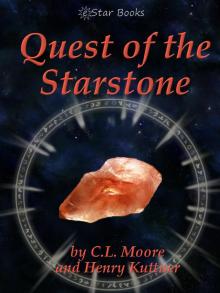 Quest of the Starstone
Quest of the Starstone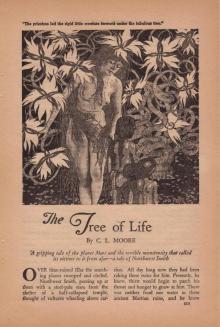 The Tree of Life
The Tree of Life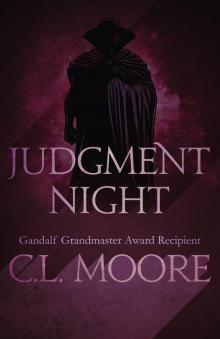 Judgment Night
Judgment Night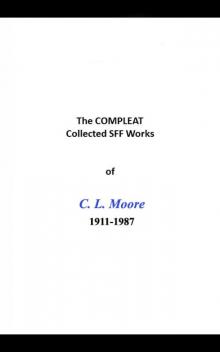 The COMPLEAT Collected SFF Works 1911-1987
The COMPLEAT Collected SFF Works 1911-1987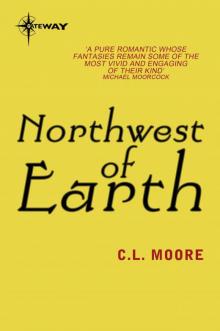 Northwest of Earth
Northwest of Earth No Boundaries
No Boundaries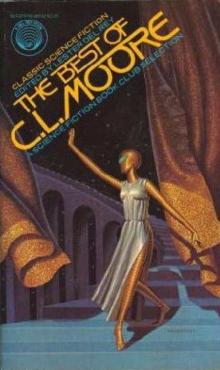 The Best of C. L. Moore
The Best of C. L. Moore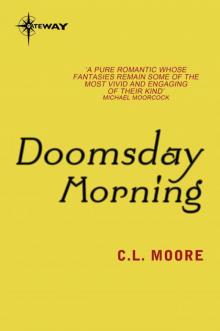 Doomsday Morning M
Doomsday Morning M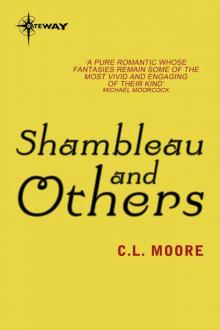 Shambleau and Others M
Shambleau and Others M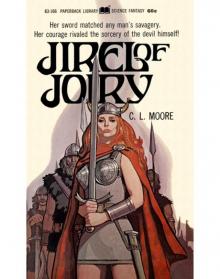 Jirel of Joiry
Jirel of Joiry Judgment Night M
Judgment Night M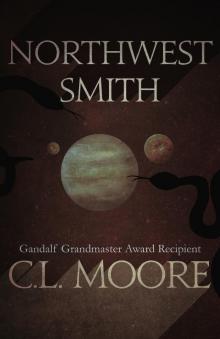 Northwest Smith
Northwest Smith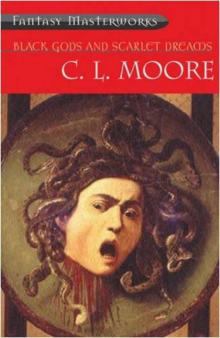 Black Gods and Scarlet Dreams
Black Gods and Scarlet Dreams